|
Vietnam Headlines: Top Stories from May 29 Vietnam Seeks China’s Expertise for Energy Transition World Bank’s Contributions to Vietnam’s Development Recognized Foreign Investment in Vietnam Reaches $11 Billion in Five Months Vietnamese Tourism Aims to Improve Global Ranking Vietnam Deploys 800 Peacekeepers on UN Missions in a Decade RoK-Vietnam Collaboration Enhances Cultural and Tourism Exchanges Yoga Festival Attracts 2,000 Participants Vietnam Honors Peacekeeping Operations Department New Freight Transport Route Opens at Huu Nghi–Youyi Guan Border Gate |
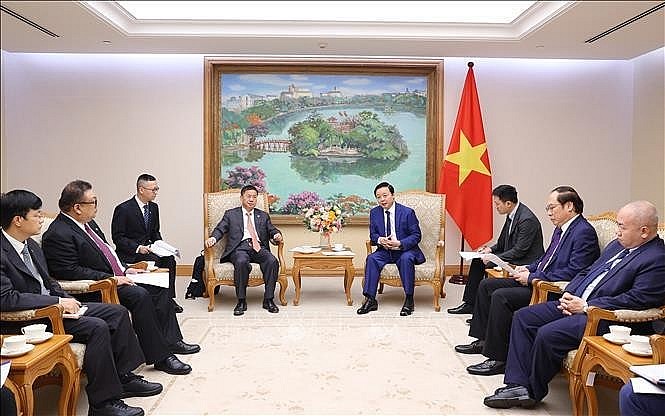
|
| Photo: VNA |
Vietnam Seeks China’s Expertise for Energy Transition
Deputy Prime Minister Tran Hong Ha met with Luo Bi Xiong, Chairman of China Power Engineering Consulting Group Co., Ltd. (CPECC), in Hanoi on May 27.
Ha acknowledged China’s advancements in energy modernization, particularly in renewable energy development and expertise across all stages, from design to operation and management.
He expressed confidence that enhanced collaboration between Vietnamese and Chinese companies, especially in the energy sector, would strengthen the comprehensive strategic cooperative partnership between the two nations.
Ha highlighted Vietnam’s energy transition and the implementation of the National Power Development Plan (PDP8) for 2021-2030, with a long-term vision until 2050. He noted that this plan requires adjustments to legal regulations related to renewable energy development.
Recognizing CPECC’s extensive experience in power and renewable energy projects globally and in Vietnam, Ha sought their insights on technology selection, policy refinement, and effective implementation of PDP8.
Additionally, he requested solutions for streamlining electricity transmission across regions, considering the integration of diverse energy sources such as hydropower, coal, gas, and renewables.
The Vietnamese Government is committed to creating a favorable environment for effective collaboration between Vietnamese and Chinese enterprises, Ha assured.
The host suggested CPECC work directly with relevant ministries and enterprises to clarify mechanisms, legal regulations, technical requirements, and investment feasibility for mutual benefit.
Luo presented CPECC’s achievements in energy planning, infrastructure development, consulting, and technical expertise in China, globally, and specifically in Vietnam.
He proposed projects focusing on integrated energy centers, high-voltage power transmission lines, and new green fuel production in Vietnam.
World Bank’s Contributions to Vietnam’s Development Recognized
Prime Minister Pham Minh Chinh expressed appreciation for the World Bank’s (WB) contributions to Vietnam’s socio-economic development since 1993, totaling $24 billion, particularly in poverty reduction.
On May 27, Prime Minister Chinh hosted a reception in Hanoi for Vice President of the World Bank (WB) Manuela V. Ferro and WB Country Director for Vietnam, Laos, and Cambodia, Mariam J. Sherman, along with their associates.
The Vietnamese leader commended the nation’s commitment to a deeper partnership and requested WB’s continued support for programs and policies promoting sustainable and inclusive growth, as well as green, digital, and knowledge-based economies.
In response, Ferro affirmed WB’s trust in Vietnam by establishing its regional office in Hanoi. She assured WB’s readiness to work closely with Vietnam to ensure the efficient operation of the regional office, benefiting Vietnam, Laos, and Cambodia.
Ferro highlighted ongoing collaboration with Vietnamese ministries to review existing projects and develop a new phase of the Vietnam-WB Country Partnership Framework.
Prime Minister Chinh welcomed the WB President’s visit to Vietnam and proposed $11 billion in WB lending for the next five years, focusing on large-scale infrastructure, energy, and agriculture.
He encouraged WB to consider flexible capital management models and adjust its approach to provide preferential loans for critical infrastructure projects.
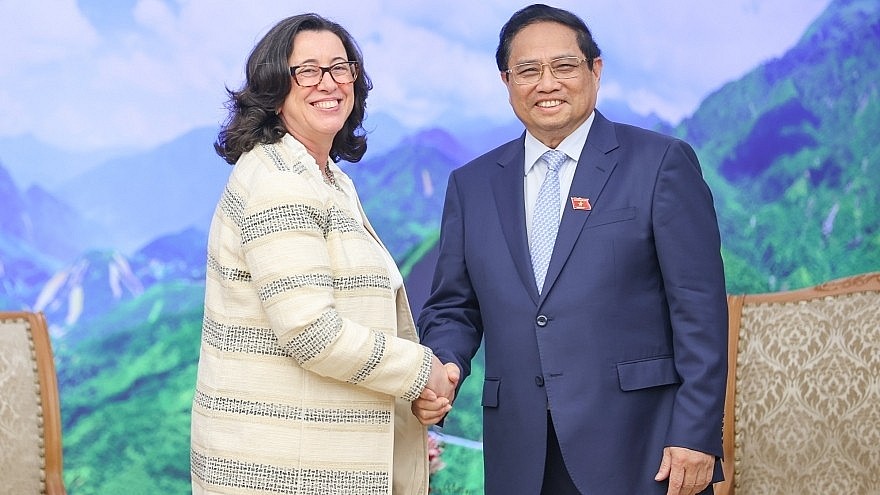
|
| Prime Minister Pham Minh Chinh (R) meets with Vice President of the World Bank (WB) Manuela V. Ferro. (Photo: VGP) |
These projects should have a broad impact, connecting regions, creating development space, and effectively addressing climate change concerns. Specifically, he mentioned the North-South high-speed railway, the Ho Chi Minh City-Can Tho railway, the Hanoi metro line, and the development of 1 million hectares of quality rice fields in the Mekong Delta.
Vietnam has made significant progress in governance, investment structure, procedure reform, and a people-centric approach, ensuring a harmonious balance of interests among the people, the State, and businesses.
Chinh expressed hope for WB’s continued support in accessing the global carbon credit market, creating new financing avenues for Vietnam’s climate commitments.
The WB Vice President pledged continued partnership with Vietnam to achieve its development goals for 2030 and 2050 through specific actions and projects. WB will collaborate closely to discuss and devise solutions to accelerate and enhance the efficiency of their joint work.
Foreign Investment in Vietnam Reaches $11 Billion in Five Months
Vietnam attracted over $11.07 billion in foreign direct investment (FDI) during January-May, a 2% increase compared to the same period last year, according to the Ministry of Planning and Investment (MPI)’s Foreign Investment Agency.
Of this, $7.94 billion was invested in 1,227 new projects, representing a year-on-year increase of 50.8% and 27.5%, respectively. Meanwhile, 440 existing projects received additional capital totaling over $2.08 billion, a decrease of 9.3% and 8.7% compared to the previous year.
Foreign investors also contributed more than $1.05 billion through 1,158 capital contribution and share purchase deals during this period, reflecting a decrease of 68.2% and 9.4%.
Among the 78 countries and territories investing in Vietnam in the first five months, Singapore was the largest investor, with nearly $3.25 billion, accounting for 29.3% of the total investment and a 28.2% year-on-year increase.
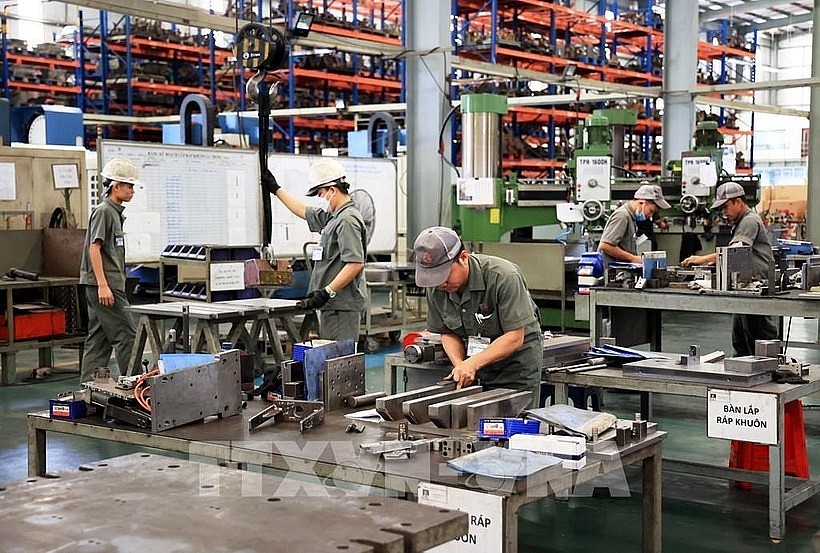
|
| Workers at Giang Dien Industrial Park, Trang Bom district, Dong Nai province (Photo: VNA) |
Foreign investment flowed into 17 out of 21 sectors, with the processing and manufacturing industry leading with over $7.42 billion, or 67.1% of the total investment, and an 11.9% increase year-on-year. The real estate sector attracted $1.98 billion in investment, a 70.8% rise, followed by wholesale and retail sales ($514.2 million) and transport and warehousing ($342.2 million).
The MPI noted that most FDI was directed towards localities with sound infrastructure, stable human resources, proactive administrative procedure reform, and active investment promotion, such as Ba Ria – Vung Tau, Hanoi, Bac Ninh, Ho Chi Minh City, Dong Nai, Quang Ninh, Bac Giang, Hai Phong, Thai Nguyen, and Hung Yen.
The disbursement of FDI capital grew by 7.8% to reach approximately $8.25 billion during the five-month period.
As of May 20, Vietnam had 40,285 valid projects with a combined capital of $481.33 billion, of which about $305.43 billion has been disbursed.
Vietnamese Tourism Aims to Improve Global Ranking
The Vietnam National Authority of Tourism has stated that the World Economic Forum (WEF)’s latest Travel & Tourism Development Index (TTDI) 2024 does not accurately reflect the development capacity of the Vietnamese tourism industry.
In the overall TTDI 2024 rankings, Vietnam was placed 59th out of 119 countries and territories, with an average score of 3.96 out of 7. This is a downgrade compared to 2022, when Vietnam ranked 52nd with an average score of 4.1 points.
Within the index, Vietnam ranked 115th out of 119 in the socio-economic impact index, scoring 2.95 points.
However, the Vietnam National Authority of Tourism believes that the index did not accurately reflect the impact of Vietnamese tourism on socio-economic development, as the WEF may not have had access to updated statistical data for the local tourism sector during the 2021-2024 period.
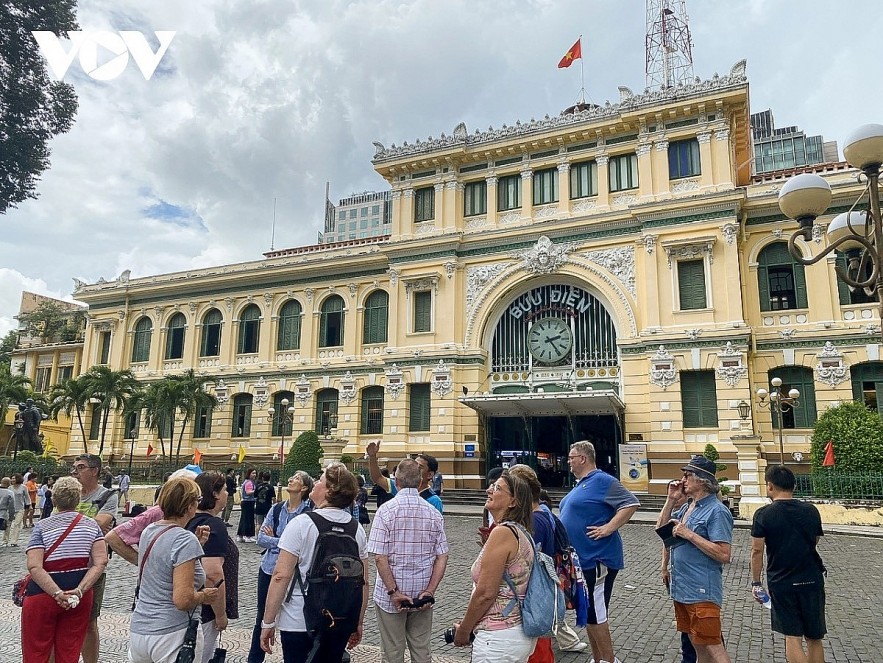
|
| Photo: VOV |
The authority also highlighted visa waivers for travelers from 25 countries, with 13 enjoying unilateral exemption. Since August 2023, Vietnam has offered e-visas to all nationalities and extended the maximum stay from 30 to 90 days, with unlimited entries.
In 2023, Vietnam welcomed 12.6 million foreign arrivals, a 3.4-fold increase from 2022. This year, the country aims to serve about 18 million international visitors and 110 million domestic tourists, with a revenue target of VND840 trillion for the sector.
To improve its position in the WEF’s TTDI, the Vietnamese tourism sector will work with relevant agencies to update data and ensure an accurate evaluation of the socio-economic impact of tourism.
Additionally, the sector will focus on preservation, infrastructure investment, and stabilizing tourism service prices to enhance its global ranking.
Vietnam Deploys 800 Peacekeepers on UN Missions in a Decade
Over the past ten years, Vietnam has dispatched more than 800 officers and soldiers on UN peacekeeping missions, said Colonel Pham Manh Thang, Director of the Vietnam Department of Peacekeeping Operations, on Monday.
The department and its Engineering Unit Rotation 1 were honored with the third-class Fatherland Defense Medal on the tenth anniversary of their foundation during a ceremony in Hanoi.
The Level 2 Field Hospital No. 4 and Colonel Mac Duc Trong, captain of the Engineering Unit Rotation 1, were awarded certificates of merit from the Prime Minister.
Colonel Thang stated that, based on assessments from UN agencies and mission commanders, the Vietnamese peacekeeping force has successfully completed its tasks. The professionalism, inventiveness, and discipline of the Vietnamese peacekeepers have impressed mission commanders and international colleagues.
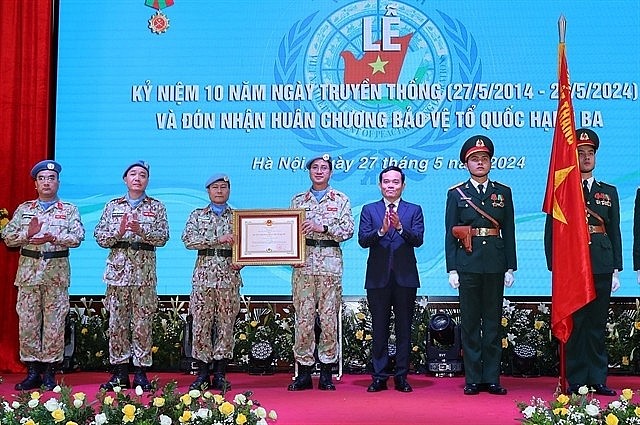
|
| Deputy Prime Minister Tran Luu Quang presents the third-class Fatherland Protection Order to leaders of the Vietnam Department of Peacekeeping Operations. — VNA/VNS Photo Trong Duc |
Among the 800 officers and soldiers deployed, there were two engineering unit teams in Abyei, five teams of Level 2 Field Hospital personnel in South Sudan, and 114 individual officers.
The success rate of Vietnamese officers completing their assignments is significantly higher than the UN average, Colonel Thang noted.
In addition to providing medical services and treatments, the Vietnamese engineering units in Abyei have contributed to road construction, classroom renovation, volunteer teaching, and drilling water wells for local communities.
The Vietnam Level 2 Field Hospitals in South Sudan have provided excellent medical care to patients, including locals and UN employees. They have employed innovative methods and successfully performed complex surgeries and air ambulance transfers in risky situations.
Hoang Xuan Chien, Deputy Minister of National Defense and Head of the interdisciplinary working group, instructed the department to enhance research and strategic consultation to expand the number of forces, areas, and positions in UN peacekeeping missions.
He emphasized the importance of increasing the participation of female soldiers and collaborating with relevant agencies and international organizations to leverage resources and share experiences.
The peacekeeping force has also been directed to strengthen its capacity to coordinate national peacekeeping activities effectively.








